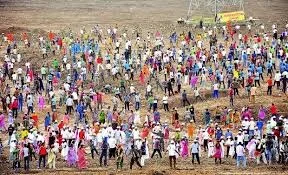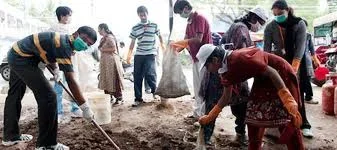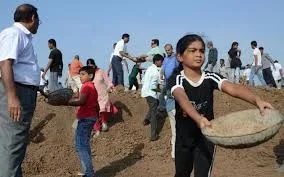prasad1
Active member
It feels like a carnival at Ukkadam, home to the Periyakulam Lake. It is the final Sunday of volunteering, as the monsoons are expected any time now. School children are shrill with excitement, college students jump out of buses laughing and shouting out greetings; picnic umbrellas dot the area. The CRPF, the police and people from the Armed Forces work together in precision, as if performing a drill. Three hundred NCC cadets take up position. A large group of employees from a cement factory talk animatedly, while nearby, the entire team from a Tamil daily has shown up. “Instead of being only the observers who write about events, we unanimously decided to pitch in with volunteer work,” says one of them.
More cars and buses turn into the site, entire families on two-wheelers drive in. Several senior citizens take charge and direct people to the various areas from where they will begin digging. Bhanumati mami leans into a microphone and belts out a popular film song: Anne anne sippai anne; namba ooru nalla ooru, ippo romba kettu poche anne. The song is greeted with whistles, applause and requests for more songs. Mrs. Pandian, retired Botany teacher, sits on a bench taking down the names and contact details of those who have volunteered. Cousins S. Athmika and V.P. Shivani have been dragged out of bed on a Sunday morning by their grandfather. Someone from Krishnagiri offers to give a demo on how to bathe in one and a half litres of water.
M. Lukman, a fruit vendor, has spent all his life near the lake. “It teemed with birds, and the greenery and water made it look like something out of an English travel channel,” he says. He hopes this initiative will improve the plight of other wetlands as well, as the livelihood of several fishermen has been severely affected. “Plenty more needs to be done, but I have faith that the lake will be restored to its original glory.”
Many people share this belief. What is happening at Periyakulam is more than just physical shramdaan, or donation of labour, as R. Raveendran of RAAC says. “When the lake comes alive, we will know we had something to do with it. This ownership will ensure that we will never let it come to such a pass again.”
The_Hindu
More cars and buses turn into the site, entire families on two-wheelers drive in. Several senior citizens take charge and direct people to the various areas from where they will begin digging. Bhanumati mami leans into a microphone and belts out a popular film song: Anne anne sippai anne; namba ooru nalla ooru, ippo romba kettu poche anne. The song is greeted with whistles, applause and requests for more songs. Mrs. Pandian, retired Botany teacher, sits on a bench taking down the names and contact details of those who have volunteered. Cousins S. Athmika and V.P. Shivani have been dragged out of bed on a Sunday morning by their grandfather. Someone from Krishnagiri offers to give a demo on how to bathe in one and a half litres of water.
M. Lukman, a fruit vendor, has spent all his life near the lake. “It teemed with birds, and the greenery and water made it look like something out of an English travel channel,” he says. He hopes this initiative will improve the plight of other wetlands as well, as the livelihood of several fishermen has been severely affected. “Plenty more needs to be done, but I have faith that the lake will be restored to its original glory.”
Many people share this belief. What is happening at Periyakulam is more than just physical shramdaan, or donation of labour, as R. Raveendran of RAAC says. “When the lake comes alive, we will know we had something to do with it. This ownership will ensure that we will never let it come to such a pass again.”
The_Hindu



